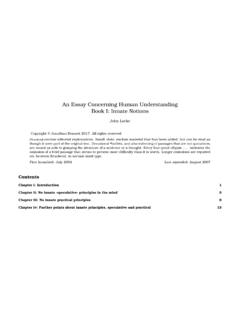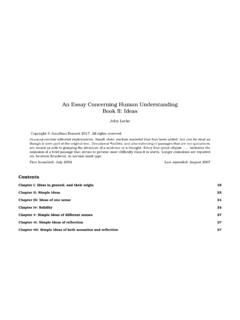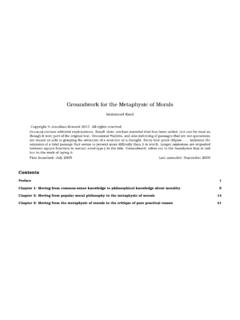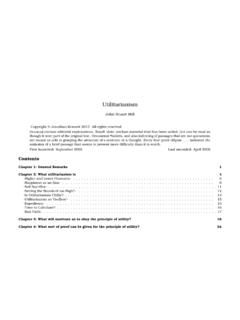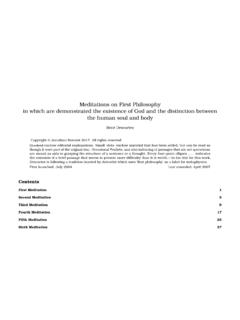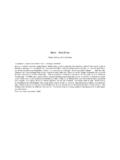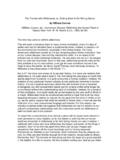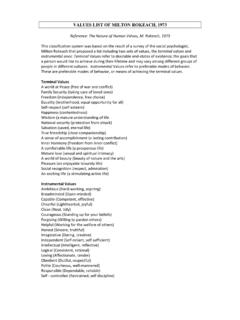Transcription of Treatise of Human Nature, Book 1 - Early Modern …
1 Treatise of Human nature , Book 1. David Hume 1739. Copyright Jonathan Bennett 2017. All rights reserved [Brackets] enclose editorial explanations. Small dots enclose material that has been added, but can be read as though it were part of the original text. Occasional bullets, and also indenting of passages that are not quotations, are meant as aids to grasping the structure of a sentence or a thought. Every four-point ellipsis .. indicates the omission of a brief passage that seems to present more difficulty than it is worth. First launched: July 2004. Contents Part i: Ideas, their origin, composition, connection, abstraction, etc. 1. 1: The origin of our ideas .. 1. 2: Division of the subject .. 4. 3: Memory and imagination .. 5. 4: Association of ideas .. 6. 5: Relations .. 8. 6: Modes and substances .. 9. 7: Abstract ideas .. 10.
2 Part ii: The ideas of space and time 16. 1: The infinite divisibility of our ideas of space and time .. 16. 2: The infinite divisibility of space and time .. 17. 3: The other qualities of our ideas of space and time .. 20. Treatise , Book 1 David Hume 4: Objections answered .. 23. 5: The same subject continued .. 31. 6: The ideas of existence and of external existence .. 38. Part iii: Knowledge and probability 40. 1: Knowledge .. 40. 2: Probability, and the idea of cause and effect .. 42. 3: Why a cause is necessary .. 45. 4: The component parts of our reasonings about cause and effect .. 47. 5: The impressions of the senses and memory .. 48. 6: The inference from the impression to the idea .. 50. 7: The nature of the idea or belief .. 54. 8: The causes of belief .. 57. 9: The effects of other relations and other habits .. 61. 10: Influence of belief.
3 66. 11: The probability of chances .. 66. 12: The probability of causes .. 70. 13: Unphilosophical probability .. 73. 14: The idea of necessary connection .. 78. 15: Rules by which to judge of causes and effects .. 88. 16: The reason of animals .. 89. Part iv: The sceptical and other systems of philosophy 92. 1: Scepticism with regard to reason .. 92. 2: Scepticism with regard to the senses .. 96. 3: The ancient philosophy .. 113. 4: The Modern philosophy .. 117. 5: The immateriality of the soul .. 120. 6: Personal identity .. 130. 7: Conclusion of this book .. 139. Treatise , Book 1 David Hume i: Ideas Part i: Ideas, their origin, composition, connection, abstraction, etc. 1: The origin of our ideas All the perceptions of the Human mind fall into two distinct special name to mark the [In this work, name' is kinds, which I shall call impressions' and ideas'.]
4 These often used to cover not only proper names but also general terms such differ in the degrees of force and liveliness with which they as idea'.]. strike upon the mind and make their way into our thought Another division of our perceptions should be noted; this or consciousness. The perceptions that enter with most force one cuts across the line between impressions and ideas. It is and violence we may name impressions'; and under this the division into simple and complex. Simple perceptions . name I bring all our sensations, passions, and emotions, that is, simple impressions and ideas are ones that don't as they make their first appearance in the soul [= mind'; no allow any distinction or separation among their parts . Com- religious implications]. By ideas' I mean the faint images of plex perceptions, on the contrary, can be distinguished into the others in thinking and reasoning: for example, all the parts.
5 Though a particular colour, taste, and smell, are quali- perceptions aroused by your reading this book apart from ties all united together in this apple, it's easy to perceive that perceptions arising from sight and touch, and apart from they aren't the same as one another and can least be distin- the immediate pleasure or uneasiness your reading may guished from each other and so one's total perception of cause in you. I don't think I need to say much to explain the apple is complex . this distinction: everyone will readily perceive for himself Having through these divisions ordered and arranged our the difference between feeling ( impressions ) and thinking subject-matter ( perceptions ), we can now set ourselves to ( ideas ). The usual degrees of intensity of these are eas- consider more accurately their qualities and relations.
6 The ily distinguished, though there may be particular instances first fact that springs to my attention is that our impressions where they come close to one another. Thus, in sleep, in a greatly resemble our ideas in every respect except their de- fever, in madness, or in any very violent emotions of soul, gree of force and liveliness. Perceptions of one kind seem our ideas may become like our impressions; as on the other to be, in a way, reflections of perceptions of the other kind;. hand it sometimes happens that our impressions are so faint so that all the perceptions of the mind do double duty, ap- and low that we can't distinguish them from our ideas. But pearing both as impressions and as ideas. When I shut although ideas and impressions are fairly similar in a few my eyes and think of my study, the ideas I form are exact cases, they are in general so very different that no-one can representations of the impressions I felt when I was in my hesitate to classify them as different and to give to each a study ; every detail in one is to be found in the other.
7 And I. 1. I hope you will allow me to use the words impression' and idea' in senses different from their usual ones. Perhaps, indeed, I am restoring idea' to its original sense, from which Mr Locke has perverted it by making it stand for all our perceptions. By the term impression' I don't mean anything about how our lively perceptions are produced in the soul; I merely label the perceptions themselves; and for this I don't know any particular name, in English or any other language. 1. Treatise , Book 1 David Hume i: Ideas find the same resemblance and representation when I survey ple idea that has no corresponding impression. If he doesn't my other perceptions: ideas and impressions seem always answer this challenge and it's certain that he can't then to correspond to each other. This remarkable fact holds my his silence and our own observation will suffice to establish attention for a moment.
8 Our conclusion. Surveying the field more accurately, I find I have been Thus we find that all simple ideas and impressions re- swept along by how things first appeared to me, and that I semble each other; and as the complex are formed from must with help from the simple/complex distinction limit simple ones we can say generally that these two sorts of per- this general thesis that all our ideas and impressions are ception exactly correspond. Having uncovered this relation, resembling. I observe that many of our complex ideas never which requires no further examination, I am curious to find had impressions that corresponded to them: I can imagine a some of the other qualities of impressions and ideas . Let city such as the New Jerusalem, with golden pavements and us consider what brings them into existence: as between ruby walls, though I never saw such a thing.
9 And I observe impressions and ideas, which are causes and which are that many of our complex impressions are never exactly effects? copied by ideas: I have seen Paris, but I can't form an idea of The full examination of this question is the subject of this that city that perfectly represents all its streets and houses book; so I shall here content myself with establishing one in all their detail. general proposition: So I perceive that although there is in general a great All our simple ideas, when they first appear, resemblance between our complex impressions and ideas, are derived from simple impressions which corre- it is not true across the board that they are exact copies of spond to them and which they exactly represent. each other. Now let us consider how the case stands with In looking for phenomena to support this proposition, I can our simple perceptions.
10 After the most accurate examina- find only two kinds; but the phenomena of each kind are tion I am capable of, I venture to say that here the rule obvious, numerous, and conclusive. holds without exception: that every simple idea has a simple As a preliminary to the first kind of phenomenon , I first impression that resembles it, and every simple impression go over again in my mind, and make myself certain, of the has a corresponding idea. The idea of red that we form in proposition that I have already asserted, that every simple the dark differs only in degree of intensity , not in nature , impression is attended with a corresponding idea, and every from the impression of red that strikes our eyes in sun- simple idea is attended with a corresponding impression. shine. You can satisfy yourself that I am right about this by From this constant conjunction of resembling perceptions going over as many of your simple impressions and ideas as I immediately conclude that there is a great connection be- you like; it's impossible to prove my point by going over all of tween our corresponding impressions and ideas, and that them!

